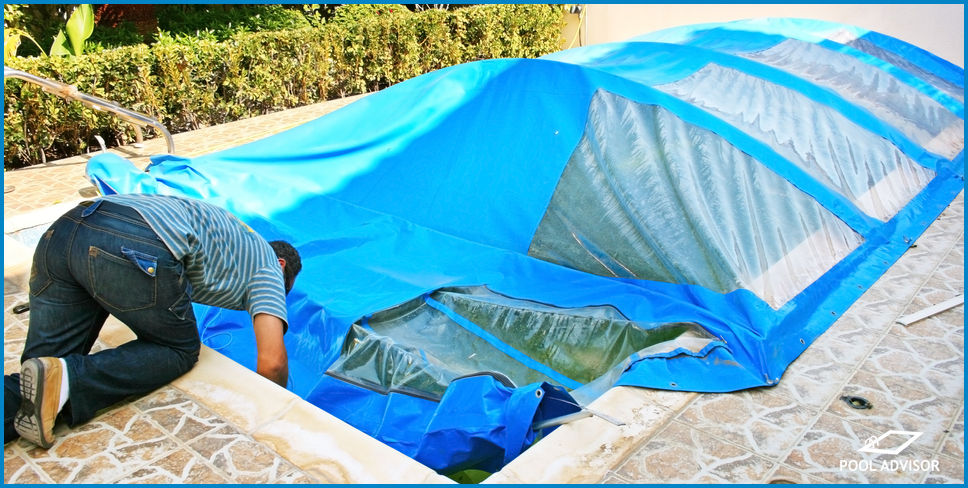
Pool Water Black After Winter - What To Do About It?
The last thing you want to see when you first open your pool after the winter is black water. Black water can be a sign of many different pool issues, and can be a complicated and expensive condition to treat.
In this article, we’ll discuss the potential causes of your black pool water, how to fix it, and our top tips to help you prevent black pool water from developing next winter.
What Causes Pool Water to Be Black After Winter?
There are a few different things that can contribute to black pool water forming during the winter. These include algae infestations, tannins released by an accumulation of decaying organic debris, or high amounts of dissolved metals in your pool’s source water, particularly silver.
Algae infestations can occur during the winter if your pool was not adequately winterized, especially if an algae problem was not fully wiped out before the pool was covered. If this is the case, this algae can also die off during colder temperatures and begin to decompose in the pool, creating a dirtier, darker appearance than the green slime most of us associate with algae.
If you fill your pool with bore water, it is possible that high concentrations of dissolved metals may be present in your pool. Once these metals oxidise and tarnish in the water, they can cause water discoloration and surface stains.
Organic debris such as leaves and twigs can also cause pool water to turn black. If your pool was covered during the winter, be sure to inspect the tarp you used for any tears or rips.
In some cases, it has been reported that rainwater is capable of running underneath the pool cover and entering the pool that way. This can be a large source of water pollution, especially if the water runs through grooves on the edge of your pool’s surface that already contain high amounts of dirt.
Diagnosing the problem
It can be hard to determine the source of your black water just by looking at it. In order to better determine the cause of your black pool water, we recommend performing a phosphate test on your water.
While testing your phosphates is not a guaranteed way to learn the cause of your pool’s black water, knowing if their level is high in your water can be a very useful piece of information.
Phosphates are a natural, harmless substance that is typically released by decomposing organic debris and may also enter your pool through yard runoff. The reason phosphates are important is that they serve as a vital food source for algae, allowing more intense infestations to occur.
If you have moderate to high levels of phosphates, such as those ranging from 300-500 parts per billion (ppb) or above, it is extremely likely that your black pool water is caused by decomposing organic debris or algae.
If you have phosphate levels below 300 ppb, it is very unlikely that your problem is related to organic debris or algae, because the infestation would have to be very intense to produce that much of a change in your pool’s water colour. In these cases, dissolved trace metals are the most likely culprit.
How to Fix Black Pool Water
Before taking chemical measures to clear up black pool water, we recommend performing a large water change if you are able.
Replacing a large portion of your pool’s water with fresh water will dilute the contaminants present, making chemical treatment less expensive. However, depending on your region, pool size, and relative cost of water, doing a water change may be a less feasible route.
After replacing some of your pool water (if possible) you will want to work to restore your pool’s chemistry to near normal levels in preparation for a shock treatment.
If Phosphates Are High
If you performed a phosphate test and found high levels, we recommend performing a shock treatment followed by a phosphate removing product like this one to further reduce the changes of algae from recurring.
Use this pool shock calculator to work out the proper dose for your pool.
If you want to be even more sure, it is possible to use an algaecide. The Lo-Chlor Pool Algaecide is great for opening your pool after the winter and can prevent algae from coming back for several months afterwards.
After these treatments, run your filter to remove any dead algae or other debris that has accumulated. If your filter is unable to restore your water clarity, you will want to use a clarifier or flocculant. For pools that are especially contaminated, we recommend a flocculant.
Flocculants work by making tiny debris in your pool stick together in clumps and fall to the bottom of your pool. After it has fallen to the bottom, vacuum the debris out to waste to restore your pool to its former clarity.
If Phosphates Are Low
If your pool is black due to dissolved metals, you likely did not find high phosphate levels. Dissolved metals can alter water colour and may also cause stains on your pool’s lining. Use a metal remover product to remove dissolved metals from your water and prevent staining.
Conclusion
Although finding black water in your pool after winter can be startling, this condition is not untreatable.
Phosphate testing can help you narrow down the likely causes of your black pool water, whether it be caused by organic debris, algae, or dissolved metals in the water, helping you choose the best treatment methods.
Next time, follow our pool closing guide to make sure you don't end up with black water in spring!
Do you have any questions about pool water being black after the winter season? Let us know down in the comment section, we’d love to help!

Louis
A chemical engineer by trade, Louis is committed to debunking myths in the pool industry by explaining the underlying chemistry and making it accessible to all.
